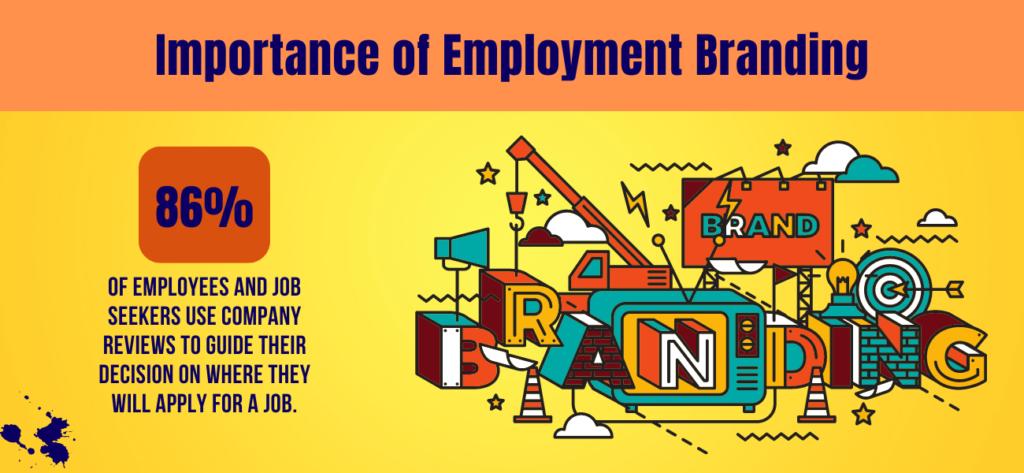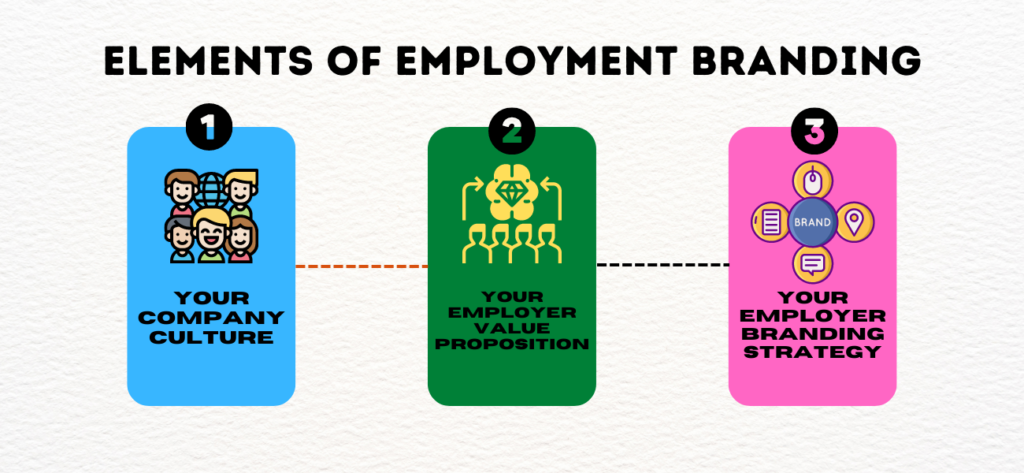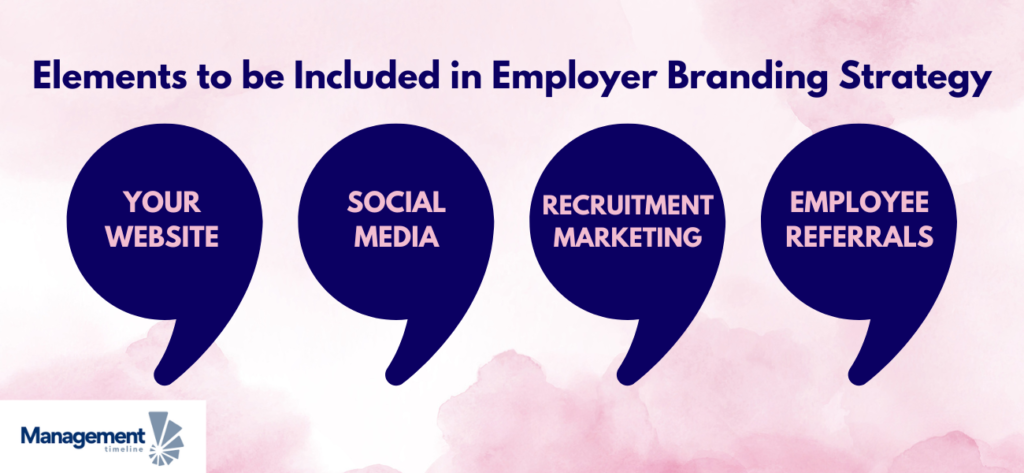What is Employment Branding?

You may have heard the term “employment branding” before, but what does it mean? Simply put, employment branding is the process of marketing your company to potential employees as a great place to work. This can be done in a variety of ways, from writing job postings that accurately reflect your company culture to creating an employee referral program.
Importance of Employment Branding
Did you know if an employer actively manages its employer brand, 75% of active job seekers are likely to apply for a job? More interestingly, 86% of employees and job seekers use company reviews to guide their decision on where they will apply for a job.

Therefore, in today’s competitive job market, ensuring your company stands out as a great workplace is more important than ever. By taking the time to create a strong employment brand, you’ll be able to attract top talent and improve your chances of making a great hire.
Let’s take a closer look at some of the most important elements of employment branding.
Elements of Employment Branding
The following are the key elements of employment branding:

1. Your Company Culture
According to the TeamStage website, 46% of job-seekers value company culture as one of the important factors to consider before joining any organization, and 15% of job-seekers refused to join a new job due to unfavorable company culture.
Therefore, company culture is one of the most important aspects of employment branding. Your company culture is the unique combination of values, traditions, and behaviors that make up your workplace. It’s what makes your company different from all the others out there.
When you’re thinking about your company culture, it’s important to consider what kind of environment you want to create for your employees. Do you want them to feel like they’re part of a family or do you prefer a more formal workplace? What values are important to you? Once you’ve answered these questions, you can begin to develop policies and practices that reflect your desired company culture.
Remember without conducting an employer brand audit you can’t hope to influence or manage your employer brand. If you don’t know what people think about you, how can you influence an employer brand audit is essential.
2. Your Employer Value Proposition
Your employer value proposition (EVP) is basically what makes working at your company unique. It’s what will attract employees to your company and keep them there for the long haul. When crafting your EVP, think about the most important things to your employees. Do they value flexible work hours? A casual dress code? Free snacks in the break room? Figure out what makes your company unique and use that to your advantage when marketing to potential hires.
It’s also important to remember that your EVP should be more than just words on a page—it should be reflected in everything you do as an employer. From how you treat job candidates during the interview process to how you onboard new hires, every interaction should be an opportunity to show off what makes working at your company so great.
Your employer brand lives and breathes in the minds and hearts of your former, current, and future employees. In today’s increasingly competitive job market, a positive employer brand is critical. Without one, hiring and retaining the best employees becomes challenging — and costly.
3. Your Employer Branding Strategy
Once you’ve defined your company culture and EVP, it’s time to start thinking about how you will communicate those things to potential hires. That’s where employer branding comes in. An employer branding strategy is a plan for how you’re going to market your company as a great place to work both internally (to current employees) and externally (to prospective employees).
Must read: What is Goal Setting Theory?
What is An Employer Branding Strategy?
An employment branding strategy is a plan for how a company can improve its public image as an employer. This can involve creating or improving employee benefits, developing campaigns to promote the company as a great place to work, or investing in employee training and development. An employment branding strategy aims to make the company more attractive to potential employees and help existing employees feel more proud and loyal to the company. By improving its image as an employer, a company can attract and retain top talent, and create a more positive and productive work environment.
An employer branding strategy allows you to control and positively change the dialogue surrounding your company to ensure higher talent acquisition and retention. At its most basic, employer branding is how you market your company to job seekers and what employees say about your company as a workplace. A good employer branding strategy can help you attract better talent, cut down on hiring costs, and reduce employee turnover.
Elements to be Included in Employer Branding Strategy
There are a few different elements that should be included in any employer branding strategy:

1. Your Website:
Make sure your website accurately reflects your employer’s brand. Include information about your company culture and EVP on your careers page and write blog posts that showcase what it’s like to work at your company.
2. Social Media:
Use social media platforms like LinkedIn, Facebook, and Twitter to share information about open positions at your company as well as stories about what it’s like to work there. Hashtags can be a great way to promote content related to your employer brand across multiple platforms.
3. Recruitment Marketing:
Develop targeted marketing campaigns specifically designed to attract candidates with the skills and experience you need. These campaigns might include online ads, email marketing, or print ads in relevant publications.
4. Employee Referrals:
Encourage current employees to refer qualified friends and acquaintances for open positions at your company. Employee referrals are one of the most effective ways to attract top talent. Offer incentives like cash bonuses or paid time off for successful referrals so employees have extra motivation to get involved.
Must read: What is employee organizational citizenship behavior?
Purpose of an Employer Brand?
Employer branding is the single most important factor in attracting and retaining quality employees. A company’s reputation as an employer can make or break them, so it pays off for businesses to invest time into building up their own brand value with workers who are crucial members of your success.
A good employer brand not only affects how easy it is to attract the best job applicants but also how motivated and engaged your current workforce is. A strong employer brand has a significant impact on employee satisfaction and can result in lower staff turnover rates. A strong employer brand is created through strong company culture.
Benefits of Employment Branding

Creating an employer brand can be a challenge, but there are many benefits to consider if you’re thinking about taking on the task. Here are some of the most important benefits of employer branding:
1. Helps you attract top talent:
Did you know that 50% of companies are expecting to increase their staff each quarter, which is good news for job seekers? However, you might be surprised too that employers are still struggling to find top talent. According to Manpower Group Survey, 74% of U.S. companies report difficulty in filling vacant positions.
But no worries, a good employer brand will make your company more attractive to potential employees. This can help you attract and hire the best candidates for open positions.
2. Reduces Hiring Costs:
Hiring an entry-level employee is estimated to cost about 20% of that employee’s salary. Meanwhile, hiring a mid-level employee typically runs up an average cost of $60,000, or 1 to 1.5 times the employee’s salary. Hiring costs are the highest for executive-level employees.
Thus an effective employer branding strategy can help you reduce your recruiting and hiring costs. When done correctly, employer branding can help you attract passive candidates who are already interested in working for your company.
3. Increases employee engagement:
A strong employer brand can lead to increased employee engagement. In fact, engaged employees are more productive and easier to retain. A study by Gallup found that companies with high employee engagement rates saw a 19% increase in operating income and a 28% increase in earnings per share.
4. Improves employee retention:
Employee turnover can be costly for businesses. Replacing an employee can cost up to 150% of that employee’s annual salary. That’s why it’s important for businesses to focus on employee retention.
A strong employer brand can help you improve employee retention rates. When employees feel connected to their company’s mission and values, they’re more likely to stay with the company for the long haul.
5. Helps you weather a crisis:
In times of crisis, a strong employer brand can help you maintain your company’s reputation. In fact, employer branding can even help you weather a PR crisis.
Employer branding is crucial for any business that wants to stay competitive in today’s marketplace. By creating a strong employer brand, you can improve your chances of attracting and retaining top talent, reducing your hiring costs, and increasing employee engagement and retention. In addition, a strong employer brand can help you weather a crisis.







Магазины элайнеров в СПб: цены, адреса
элайнеры для выравнивания спб цена [url=https://spb-stomatologie.ru/]https://spb-stomatologie.ru/[/url].
Неоновая вывеска – идеальное решение для продаж!
неоновая вывеска на заказ [url=https://vyveska-neon.ru#неоновая-вывеска-на-заказ]https://vyveska-neon.ru[/url].
вывеска объемные буквы [url=https://www.svetovye-bukvy.store]https://www.svetovye-bukvy.store[/url].
Изготовление Вывесок на Высоком Уровне
вывески [url=print-ufpechat.ru]print-ufpechat.ru[/url].
Купить вывеску на заказ
изготовление вывесок [url=http://www.viveski-moskow.ru/]http://www.viveski-moskow.ru/[/url].